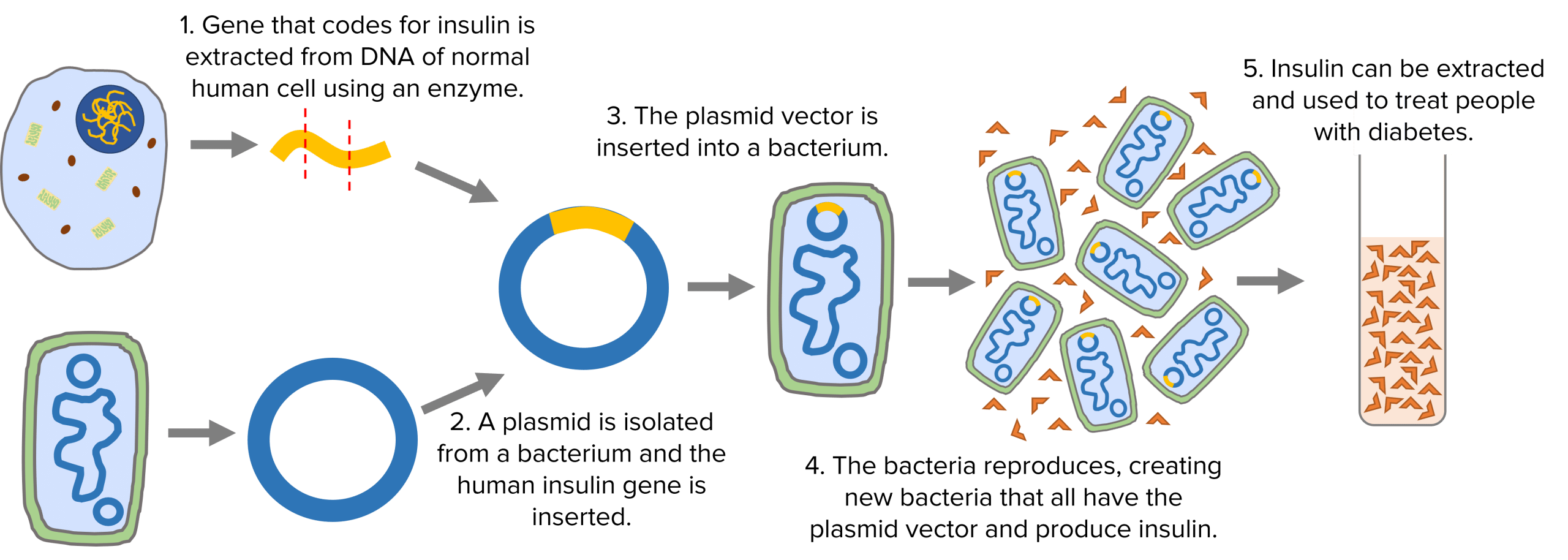Genetic Engineering
Genetic Engineering Revision
Genetic Engineering
Genetic engineering is a process that allows alleles for desired traits to be transferred into the genome of another organism, to give them the desired trait. The process is done using enzymes and vectors. Genetic engineering can be very useful in crop production and medicine but is also controversial.
What is Genetic Engineering?
Genetic engineering is the process of changing an organism’s DNA so it has a desired trait. This is done by cutting out the desired gene from another organism and inserting it into a vector.
Genetically modified (GM) organisms are those that contain the new gene.
GM plant crops can be modified to produce bigger yields. This may include growing plants that:
- Produce bigger fruits.
- Have improved nutritional value or contain additional vitamins.
- Are resistant to certain diseases.
- Produce poisons that kill insects making them resistant to insect attacks.
- Are resistant to herbicides (so herbicides kill weeds and not the crop).
Bacterial cells can be modified to produce human insulin which can be extracted and used to treat people with diabetes.
Genetic engineering could be used to treat inherited disorders in the future. This would be done by replacing the faulty genes with functional copies from another organism. This is called gene therapy.
How does Genetic Engineering work?
- Genes that code for the desired traits are first extracted from the DNA using enzymes.
- This gene is inserted into a vector, which is usually a bacterial plasmid or virus.
- The vector is used to insert the useful gene into the required cells.
- If the cells are in the early stages of development, they will develop the desired trait as they grow.
Insulin production example:

Advantages and Disadvantages
Genetic engineering has the potential to be incredibly useful in the fields of medicine and farming but widespread use is not always achievable and can sometimes cause even more issues.
Problems with GM Crops:
- GM seeds can be very expensive meaning smaller farms will not be able to afford them.
- Herbicide resistant GM crops encourage the use of herbicides which can damage the environment and can be expensive.
- There is a risk that the genes could be transferred to wild plants by pollinators. If the gene for herbicide resistance gets transferred to weeds, the herbicides will no longer be effective.
- Modifying the plants to be resistant to herbicides will reduce the biodiversity of the area and have repercussions for animals further up the food chain.
- The effects of GM crops on the humans eating them has not fully been explored and some people believe there could be harmful long-term effects.
Genetic Engineering Example Questions
Question 1: Name two traits that could be desired and genetically engineered in plant crops.
[2 marks]
Any two from:
- Bigger fruits / more food.
- Increased nutritional value / vitamins.
- Disease resistance.
- Insect attack resistance / produce insect poisons.
- Herbicide resistance.
Question 2: How are desired traits transferred into target cells / organisms?
[1 mark]
Using a vector.
Question 3: Why might smaller farms not grow GM crops?
[1 mark]
GM seeds are very expensive so they may not be able to afford them.





